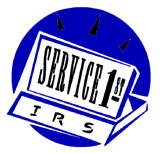 Taxpayer
Advocates Working to Put Service First at the IRS
Taxpayer
Advocates Working to Put Service First at the IRS
When Elayne Goldstein's telephone rings at the Internal Revenue Service,
the call is usually from a taxpayer who has an unresolved tax problem.
On this day, the caller was complaining about receiving a collection letter
from the IRS and was expressing frustration with having made multiple contacts
with different IRS employees about his problem - without a solution.
As far as Ms. Goldstein is concerned, the buck stops in her office.
She is a taxpayer advocate at the IRS with the authority to make sure that
the IRS takes all necessary actions to correctly and completely resolve
a taxpayer's problem. "The most important aspect of being a taxpayer advocate
is knowing that you can drop all other work and priorities to deal with
that individual taxpayer who needs your attention at the moment," Ms. Goldstein
says. Last year, taxpayer advocates like Ms. Goldstein made sure that some
237,103 cases nationwide were effectively resolved.
Even though the IRS has had a Problem Resolution Program since 1977,
recent tax legislation has given taxpayer advocates more independence from
the IRS and more authority to cut through the "red tape." According to
Ms. Goldstein, once she confirms that the taxpayer's problem meets criteria
to be brought into the Problem Resolution Program, it is assigned to a
caseworker within the IRS who is in the best position to resolve the matter.
The caseworker is required to contact the taxpayer within seven days to
acknowledge receipt of the case. In that contact, the caseworker is to
provide his or her name and telephone number, clarify what the problem
is, and provide the taxpayer with either an expected date of completion
of the case or the date by which the caseworker will get back to the taxpayer
with the status of the case.
Taxpayer advocacy at the IRS has won strong support from IRS Commissioner
Charles Rossotti. Mr. Rossotti, a business manager by trade, has put the
IRS on a path of improved customer service. He has been at the forefront
of Problem Solving Days, where taxpayers who have unresolved problems can
get one-on-one assistance from the IRS.
A provision in the recently enacted IRS Restructuring and Reform
Act gives the taxpayer advocate greater authority to intercede on behalf
of taxpayers who are experiencing a hardship. The taxpayer advocate must
now consider such factors as the threat of adverse action from the IRS,
whether there is a delay of more than 30 days in resolving taxpayer account
problems, significant costs incurred by a taxpayer while waiting for relief
from an IRS action, and irreparable injury to, or long-term adverse impact
on, a taxpayer if relief is not granted, when making a determination of
hardship.
According to Ms. Goldstein, the Problem Resolution Program is for
those people whose problem remains unresolved after attempts to resolve
the matter through traditional IRS contacts have been unsuccessful. Generally,
most taxpayer problems can be resolved on the first contact by either calling
or writing, or visiting an IRS office. A good rule of thumb before contacting
the taxpayer advocate with a problem is if the taxpayer:
l Has contacted the IRS on the same issue at least 30 days after
an initial inquiry or complaint, or 60 days after the filing of an original
or amended return or claim, or
2 Has received no response from the IRS by the date promised, including
commitment dates on IRS forms, or
3 Believes that established systems have failed to resolve the problem.
Taxpayers need to be aware of the fact that the advocates do not
have the authority to overturn the tax law or regulations. However, the
taxpayer advocate does remain a strong ally of the public to help resolve
those seemingly unsolvable problems with the IRS. "The most satisfying
part about being an advocate is seeing a customer satisfied with the work
we do for them, regardless of whether the ultimate results of the case
are in their favor or not," Ms. Goldstein says.
For the assistance of a taxpayer advocate, call toll-free at 1-877-777-4778.
People who have access to TTY/TDD equipment may call 1-800-829-4059 and
ask for Problem Resolution.
Taxpayers Have Rights
The Internal Revenue Service is changing. And people at the IRS are
working hard to provide top quality service. In dealing with the IRS, taxpayers
are entitled to fair treatment, privacy, and representation, in addition
to specific rights that apply in collection, examination, or appeals matters.
Get the details about taxpayer rights in the free IRS Publication
1, Your Rights as a Taxpayer, also available in Spanish. Call
1-800-829-3676 to order.
General Information | 1998 Tax Year Archives | Tax Help Archives | Home
